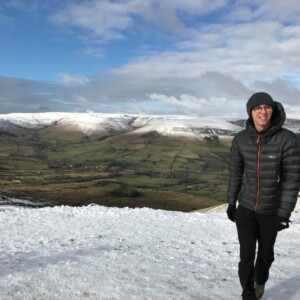
Guy Tallentire
Loughborough University
Project
Fjord meltwater and sediment delivery in a fast changing high Arctic environment
Supervisors
Dr Jeffrey Evans, Dr Richard Hodgkins, Prof Mark Brandon
PhD Summary
I am going to be studying meltwater in the form of turbid plumes from tidewater and subaerial rivers into a fjord system. As it stands, I will be going to Svalbard to do this, but may also study these phenomena in Iceland, Greenland or potentially even in Patagonia. My project aim is to discover the volume of freshwater and sediment that is being supplied to the fjord and the potential effects this has on fjord circulation. I will be doing this using a number of in-situ methods including using an Unmanned Aircraft System (UAS), commonly known as a drone, and taking oceanographic samples, as well as through remote sensing. I will be integrating these field measurements with available meteorological data, modelled freshwater inputs and available satellite imagery to determine how meltwater plume behaviour has changed over in the last 15 years.
What inspires you
As a child I spent much of my time exploring the alps of Liechtenstein in my summer and winter holidays, where I was lucky enough to learn to ski, snowboard and mountaineer. This opened my eyes to the natural world, and I fell in love with all things mountains, snow and ice which inspired me to pursue the earth sciences through school, college and to university.
Previous activity
Prior to my PhD I undertook a BSc in Geography at the University of Sheffield between 2014-2017. During this time I undertook three weeks of research in the southwestern Swiss Alps as part of my final year dissertation studying the effect of overdeepened bedrock basins on subglacial hydrology. After graduating, I chose to continue my studies in Sheffield undertaking a MSc (Res) in Polar and Alpine Change in 2017-2018, where 75% of the course was based on my independent research project titled: Determining the controls on the distribution and evolution of landslides onto glaciers in Alaska, USA. As part of this course we spent two weeks in southwest Greenland, studying ice dynamics and hydrology.
Why did you choose doctoral research?
The most stimulating parts of my undergraduate and postgraduate taught studies were those involving independent research and fieldwork, so I really wanted to continue this to doctoral level with the opportunities for even more fieldwork in remote locations too.
Why did you choose CENTA?
The CENTA studentship is a fantastic opportunity to be involved with a number of research intensive universities and research institutes, in my case Loughborough University and the Open University, getting high quality training in my field, developing new skills and interacting with Early Career Researchers and established academics.
Future plans
This PhD will help broaden and develop my employment prospects, especially with the research training provided and the opportunity of a placement as part of the CENTA DTP. I am also very much looking forward to devoting substantial time to researching a specialist topic and hope to contribute to relevant literature in the field of study during the period of my PhD. As it stands, I hope to continue into academia, but I am also open to looking at areas of industry that this PhD is training me for.
